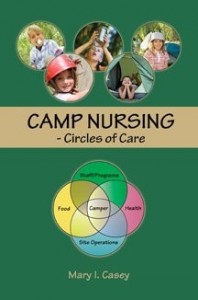Health & Wellness
The health, safety, and wellness of Canadian campers are always top of mind for Camp Directors, Doctors, Nurses, and First Aiders. As a service to Canadian camps, we are pleased to offer a collection of resources to help promote healthy and safe experiences for children at summer camps.
Association of Camp Nurses
The Association of Camp Nurses is a professional nursing organization working toward healthier camp communities by supporting the practice of camp nursing. ACN is volunteer-driven by nurses who are committed to these same goals.
Camp Nursing: Circles of Care
Camp Nursing-Circles of Care is a popular and useful resource for camp nurses across the country.
Written by experienced camp nurse and award-winning author, Mary Casey BScN PHN, Camp Nursing-Circles of Care gives an overview of the multi-faceted job of a camp nurse.
Spiral-bound for convenient reference, the book includes fifty pages of Treatment Guidelines and the accepted procedures for illness and accidents. The content and the principles presented are applicable to all camps.
Order from: www.volumesdirect.com or contact Mary Casey at CampNursingbyMCasey@gmail.com.

Lyme Disease
Since 2015, a Lyme Disease Stakeholder group, headed up by the Ontario Ministry of Health and Long Term Care involving many stakeholders from across Ontario, including the Ontario Camps Association, has been working towards the creation of Lyme Disease training and education tools.
The following information was created to help bring awareness and education on Lyme disease which you may be dealing with this summer:
Posters and fact sheets they can be ordered from:
Order online from Service Ontario at: https://www.publications.serviceontario.ca
Order by phone: 416 326-5300
Toll-free within Canada: 1-800-668-9938 (TTY toll-free within Ontario: 1-800-268-7095)
Mental Health
Depression, anxiety, ADD, ADHD, anorexia, bulimia – statistically it is likely that someone at camp will be struggling with one of these mental health issues. Are you prepared?
Mental Health professionals are encouraged that society is becoming more aware, informed and accepting of mental conditions, but we are still years away from being as open and knowledgeable about mental health as we are about physical health. Cheryl Bernknopf, RN, BScN, Professor of Nursing at Seneca College (Toronto) and a camp nurse with thirty years of experience, offers some practical advice for camp leaders:
First, the camp must determine if it has adequate personnel resources to serve campers and staff with mental health issues. Some camps are contracting with mental health experts to provide this service.
If the camp accepts campers with these special needs, preparations are necessary.
- Gather complete information on the camper’s condition with an adequate lead time for the healthcare staff to communicate with the parents if there are questions about the condition, the triggers or the treatment. Share this information with staff on a need-to-know basis.
- Inform the family of the realities of a typical camp day. Will their child be able to cope? Together discuss strategies that will enable the camper to enjoy the experience.
- Insist that the campers have been on the same medication at the same dosage for at least three months prior to camp. Reactions to new medications can be unpredictable, thereby posing an increased, unknown risk.
- Advise the parents that it is NOT advisable to take a holiday from medication. Campers need to be at their best initially to settle into camp and establish relationships.
- Educate your staff on mental health conditions. Train them to acknowledge campers’ feelings; recognize signs of distress; be sensitive and tolerant and have strategies to handle specific situations. Stress the importance of close supervision.
- Proactively, identify a safe person (e.g. counsellor, camp nurse) whom the camper can talk to at any time if they need help and a safe place to go (within sight of supervising staff) if they need a time out. Establish a private signal for the camper to indicate without drawing attention to himself that he is taking time away from the activity.
- A safe counsellor must clearly understand that their role is to listen attentively and stay calm. They are not trained therapists. They do not offer advice. If the camper becomes agitated the counselor should accompany the camper to medical help. The camper needs to know that the counsellor will be documenting the conversation and sharing the information with someone else who can keep them safe.
- If a camper has trouble talking about their feelings and problems, suggest that they may prefer to write them down.
- Enlist the help of sensitive cabin mates.
- Be clear about what is unacceptable e.g. refusal to take medications. Be discreet in the method of dispensing medications so as not to draw attention to the camper.
- Check in with the camper regularly. Be proactive to avoid social problems.
Camps should be aware that:
- There are parents who do not divulge a child’s mental health condition for fear that the camp will not accept them. Camps must communicate clearly with parents that withholding vital medical information could put their children at risk. For the safety of the child and the camp, full disclosure is necessary.
- Staff may withhold medical information for fear of not being hired or being ostracized by peers. They may be more willing to make full disclosure if they know that only the health care staff will be privy to their medical information. Their privacy will be respected unless their job performance forces the medical staff to inform the director.
Establish a procedure to enable staff to take an unscheduled break if one is needed.
Experts identify four factors for good mental and physical health:
- Regular exercise
- Healthy balanced diet
- Meal times with family
- Face to-face time with friends
Measles
With proper knowledge and planning, the risk of infectious or communicable disease outbreaks at camp can be decreased and your ability to handle the situation heightened.
Increase your measles knowledge
Fact sheets from your own region’s public health department are only a click away.
Before the campers arrive:
The camp’s Health Care Custodian should review every health form to screen for those who are NOT immunized or who are immunosuppressed (such as people undergoing chemotherapy).
Immunization dates should be provided for every camper and staff. If they are not, it is recommended that efforts be made to obtain the dates of immunization.
Have a Communicable Disease Camp Policy in place:
Develop a policy that clearly states the procedures your camp will follow if an individual is suspected to have measles (or any other communicable illness).
To ensure the health and safety of everyone:
- Prepare communication before camp starts and share it with your families. Be clear on your fee adjustment plans: will you reimburse or have a no-refund policy?
- What are your plans for campers/staff who are not immunized?
- What are your plans for campers/staff who are immunosuppressed?
- What procedures will be put into place for individuals who are suspected to have a communicable illness?
- What procedures do you have for isolation?
Know the signs and symptoms:
We worry about our population who are not vaccinated but remember that vaccinations are not 100% effective. There is a small population who, although fully vaccinated, could possibly come down with the illness. With this in mind, we need to be monitoring and assessing everyone who shows any signs of illness.
Make sure you have health staff on hand who are knowledgeable and able to identify the signs and symptoms of measles (or any communicable/infectious disease). Early detection will mean less exposure and a better ability for your camp to handle any issues that may arise.
- Symptoms begin 7 – 12 days after exposure
- Fever ≥ 38.3 degrees Celsius (oral)
- At least one of cough, runny nose, conjunctivitis (red eyes), irritability
- Small white spots may be on the inside of the mouth and throat, but not always
- Generalized red blotchy rash usually appears on the face and moves down the body
Prevention and Treatment Plan – what to do if there is a case or measles at your camp:
- At the first sign of a communicable illness, the individual must be isolated into a single room with the door closed.
- Only immune staff should be allowed to enter the room.
- The individual who is ill should wear a surgical mask (If you do not have an airborne infection isolation room, I am sure your camp does not)
- Personal protective equipment (PPE) such as gloves and gowns may be added as required.
- Make arrangements for the individual to seek an immediate medical assessment. Call ahead if you are going to a medical facility so they can take the proper precautions to avoid further exposure.
- If it is determined the individual does have measles make arrangements for the person to be sent home for the isolation period (21 days for measles).
- The measles virus can remain airborne for two hours; no individuals should be placed in the room for at least two hours
- The room must be cleaned thoroughly
Additional Steps:
Non-immunized or immunosuppressed individuals
Contact families of those who are not immunized or immunosuppressed.
A frank discussion of the situation should take place and a joint decision made on the next steps.
It is recommended these campers be removed from camp for the isolation period.
Follow your camp crisis response plan and notify your provincial association
Report to public health
All suspected cases of measles MUST be reported to the public health department in your area.
Prior to camp, obtain a list of all the reportable illnesses from your local public health department and know they are there to help you.
Other Resources:
Centers for Disease Control and Prevention
World Health Organization, Measles 2015
Camp Nurse of the Year Award
Do you know a camp nurse whose work at camp has made a difference to your camp’s health/wellness profile? has your camp nurse been an ACN member for at least one year? If so, your camp nurse is eligible to be nominated for ACN’s “Camp Nurse of the Year” Award.
A hallmark of a profession is that it recognizes excellence among its practitioners. Toward that end, ACN’s Board approved the creation of the Camp Nurse of the Year Award. This award is designed to recognize an ACN member (nurse) who, by virtue of being a camp nurse at his/her camp, made a significant difference to that camp’s health/wellness profile. While the Association’s Jeanne Otto Award recognizes the contribution to the profession of camp nursing, the Camp Nurse of the Year Award recognizes a camp nurse’s significant contribution to the health status of his/her own camp and the people there.
Educational Events
The Association of Camp Nurses offers regular educational events and meetings to provide opportunities for learners to incorporate current evidence-based practices in their own camp nursing.
Learn more about ACN's upcoming workshops, symposiums, and meetings.


